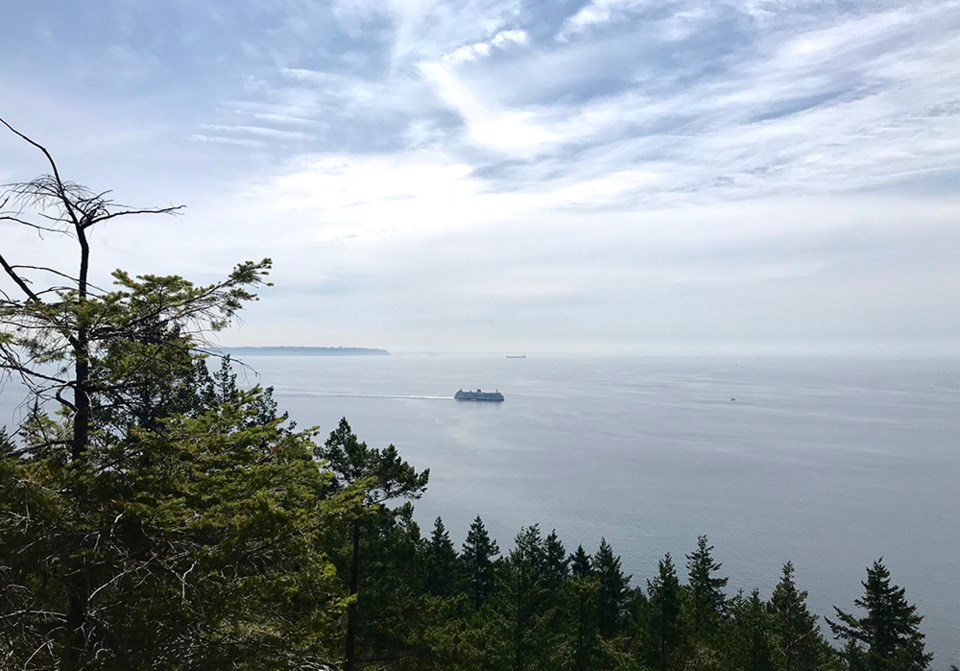It wasn’t unanimous, and it took awhile to settle on the wording, but Metro Vancouver’s proposed park project at Cape Roger Curtis took a significant step forward Monday night after a pair of bylaw amendments passed first reading.
Changes to the Official Community Plan (OCP) and Land Use Bylaw (LUB) each advanced in matching 5-2 votes by council. The decisions are meant to pave the way for allowing overnight camping at the future park. Metro Vancouver envisions up to 100 campsites across the 97-hectare space, split into a variety of different access and experience levels.
It’s been a formative stretch of days for the project, with its meeting last week. But despite reservations by some mainland members about Bowen’s level of support for the park, the with the $40-million purchase.
That decision set the stage for Monday’s Bowen council meeting where manager of planning and development Daniel Martin presented the starting points for turning the pair of bylaw amendments into law. The manager stressed each of them was very much a work in progress, and in addition to a series of edits made during the April 24 meeting, are likely to be changed many more times as the process plays out, including via feedback from committees and the public.
Martin says staff are still waiting on the results of several studies, namely a Transportation Demand Management Plan, Transportation Impact Assessment, and Visitor Management Plan. The latter of these is expected to contain ideas on how to mitigate vehicle traffic to the site, such as a reservation system. Metro Vancouver representatives present at the council meeting said they expect these to be ready in the next few weeks.
Municipal property located among the 97-hectares, including trails, roads, and beaches, is another area which needs to be discussed in the future, adds Martin. These assets can be retained by the municipality, or handed over to Metro Vancouver for managing.
New objectives and policies for OCP
Following amendments by council, the OCP portion of the rezoning application added Objective 69, which reads “To support the creation of a Regional Park at Cape Roger Curtis that may include supervised overnight camping.”
This was accompanied by new Policy 155 – “A Regional Park at Cape Roger Curtis may include a mixture of supervised overnight campsites, including group camp sites, tent cabins, vehicular campsites (but not including recreational vehicles or trailers), walk or bike-in camp sites, trails, education programs, interpretative signage, and accessory buildings or structures.” – and new Policy 190 – “Campgrounds may be permitted in a Regional Park at Cape Roger Curtis and may be accessed by backpackers, bicyclists, or by motor vehicle, but not including recreational vehicles or trailers. Campgrounds in Regional Parks should be connected to a trail network and designed to minimize impacts on the environment and should have on site supervision. Site design targeting active transportation and transit to the park will be encouraged, while vehicle use to the park should be disincentivized.”
The OCP bylaw amendment passed 5-2 with Coun. Judith Gedye and Alex Jurgensen opposed.
“It seems to me that there’s a very long list… of legitimate concerns. I don’t want to give the wrong impression that we’re ready to move on this,” said Gedye, mentioning how to approach the campsite phase-in, transportation to the park, and questions from Bowen Island Conservancy about proper development permitting in the area were among those concerns.
“I’m not even ready to sit down and entertain this first reading at this point. There’s way too much that we need to try to work through,” said Gedye. “If they’ve (Metro Vancouver) made the decision to proceed with it (land purchase), then that gives us a little bit of time to figure out what the information is that we’re going to be getting, and where we can go with that.”
Campsite makeup could change over time
The LUB amendment focused on a rezoning of the land in question from Rural Residential 1 to Passive Park, and specifying which type of structures would be allowed in the park and how many of each. The original breakdown provided was: Non-Vehicle Access Campsites (50), Vehicle Access Campsites (35), Tent Cabins (10), Group Tent Camps (5), and Staff Accommodation (1).
Mayor Andrew Leonard expressed concern about locking in the number of each type of campsite this early in the process though, pointing out that as transportation options present themselves in the future – such as the Multi-Use Path or expanded bus service – these figures may want to be adjusted.
Council decided to amend the wording to say the number of camping options may not exceed 100, with no more than one-third of them accessible by motor vehicle (excluding tent cabins and camps). One staff building was also agreed upon.
The LUB bylaw amendment also passed 5-2, with Gedye and Jurgensen again in opposition.
Coun. John Saunders said he hopes people view the first readings as just one step in the overall process. “I’ve been a little bit disheartened at some of the vitriol I’ve seen around this discussion. I get the sense that some people – not everybody – but some people seem to think that we’ve now locked ourselves into something that may not be tenable for a lot of citizens of Bowen Island.”
“That’s not the case at all. There’s a whole lot of issues to work out, and all we’ve done at this point is indicate to Metro that we intend to work in good faith to find something collaboratively that works for both Bowen Island and for Metro,” said Saunders.
Finally, in a 6-1 vote with Gedye opposed, council instructed staff to draft a restrictive covenant focused on establishing a phasing agreement for the project. Martin says he expects the park to return for discussion in May with this covenant, and potentially refer the bylaw amendments to committees, the public, and other groups if enough information has been received. A second reading would likely take place sometime in the summer.




